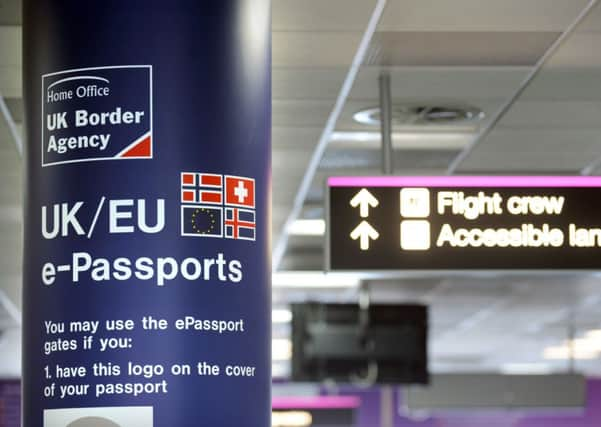Scottish independence: Border passport check claim


The SNP administration’s aim to increase the Scottish population would preclude an independent Scotland from remaining part of the Common Travel Area (CTA), which allows for an open border between the UK and Ireland, it was claimed.
The warning was issued by Scottish Secretary Alistair Carmichael as he launched a UK government analysis paper entitled Borders and Citizenship.
Advertisement
Hide AdAdvertisement
Hide AdUnder the current arrangements, the UK, the Irish Republic, Jersey, Guernsey and the Isle of Man collaborate on border policies as part of the CTA.
Travellers between those areas are not required to carry a passport for immigration purposes. But those entering from outwith these areas do have to show passports.
Mr Carmichael said the CTA worked because Irish immigration policy was closely linked to UK immigration policy.
The Scottish Government’s white paper, however, envisages an independent Scotland where immigration grows faster than elsewhere in the UK, but remains within the CTA.
The white paper proposes Scotland adopting post-study visas for graduates to stay in Scotland and creating a points-based system to encourage more skilled workers to stay.
But Mr Carmichael said such an approach to immigration was incompatible with Scotland remaining in the CTA. “What you have here is not a coherent vision at all – it’s a position that includes two fundamentally contradictory propositions,” he said.
“First of all, they say we can be part of the Common Travel Area, which is an open border between Scotland and the continuing United Kingdom, and at the same time they say they will have a widely divergent immigration policy. I think it’s pretty well accepted, and pretty well self-evident, that in fact you can have either of these things but you cannot have them both.
“My challenge to the Scottish Government today is to explain which of these it is going to be.”
Advertisement
Hide AdAdvertisement
Hide AdYesterday’s analysis paper was the tenth instalment in a series of documents produced to detail the benefits of staying in the United Kingdom.
Conservatives have repeatedly argued checkpoints are likely along the shared border between Scotland and England should there be different immigration policies.
UK immigration minister Mark Harper, a Tory MP, said: “The principles addressed in this paper are fundamental to how we define ourselves: our nationality, the border that protects us and the passport we use to travel the world.
“There are no easy answers to the question of what could happen if Scotland goes it alone. There would be a new international border and, however close our co-operation, that could mean more bureaucracy and extra controls for people travelling to visit family, go on holiday or do business.
“It would also be an unprecedented experiment with nationality and identity that would reverse centuries of common UK citizenship. It would affect not just millions of people today but also generations to come.”
The document warned that UK customs officers would have no power to protect the customs regime of an independent Scotland. Having separate customs agencies for two states would also require requests for extradition.
On citizenship, the paper warned that, under current laws, British citizens living outside the UK cannot pass their British nationality on by more than one generation. Therefore, it claimed, the children of British citizens living in an independent Scotland would be British citizens, but their grandchildren would not.
The Scottish Government’s plans to allow expats with a Scottish grandparent Scottish citizenship could result in five million people living abroad becoming entitled to becoming a Scottish citizen.
Advertisement
Hide AdAdvertisement
Hide Ad“It is possible that the numbers could equal or exceed the current population of Scotland,” the report said. “If an independent Scotland was a member of the EU, those expatriate Scottish citizens would be citizens of the EU also. This could provide a route to settlement in the EU that is not available currently to those individuals.”
Deputy First Minister Nicola Sturgeon rejected the UK government’s paper, saying it “lacked all credibility”.
She said: “Firstly, it ignores the 22 per cent staff cuts that the UK government is making to the UK Border Agency and the Scottish Government’s own proposal to establish a Scottish Border and Migration Service.
“And secondly, it completely ignores the reality of the Common Travel Area, in which the UK and Ireland already have no border controls but differing immigration policies.
“Thankfully, people in the rest of the UK are far more reasonable than Mr Carmichael and his colleagues, with polls showing that the vast majority would expect their government to work with an independent Scotland to ensure continued co-operation within the Common Travel Area.
“Indeed, the only people wanting to erect borders are Mr Carmichael’s own colleagues in the Westminster government, who are threatening to drag Scotland and the UK out of the EU and the single market. It’s time for less ‘Project Fear’ and more common sense.”
A spokesman for the Irish department of justice said: “The CTA in no way alters our control over immigration or visa matters and who can and cannot enter or reside in Ireland.”